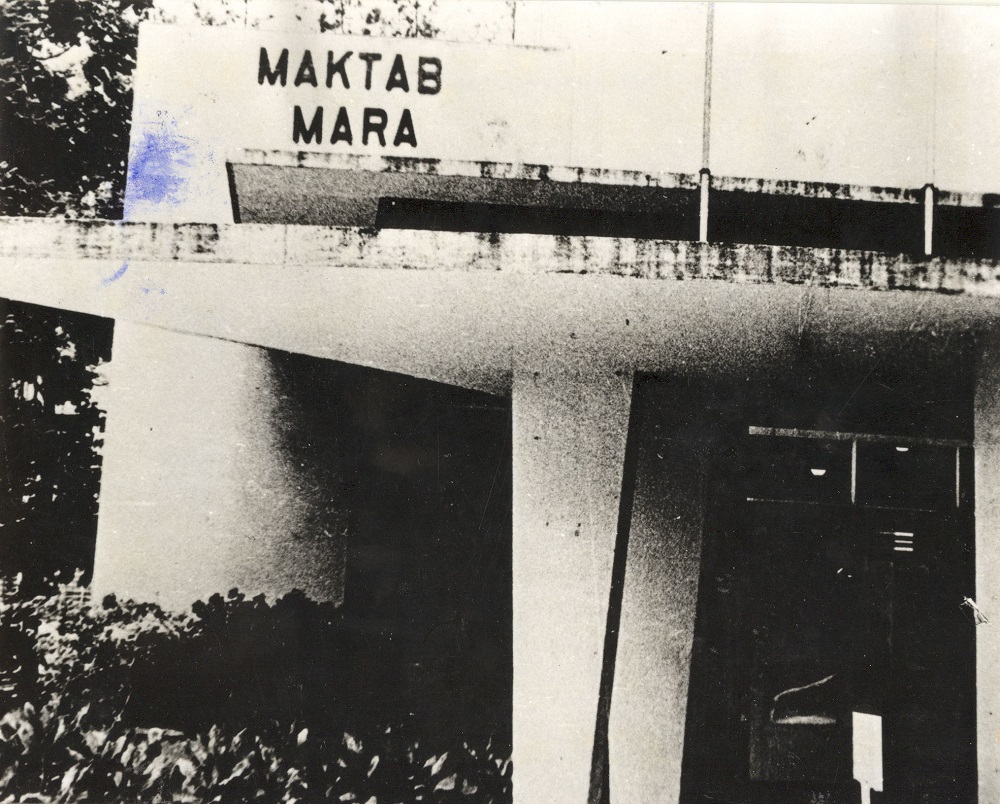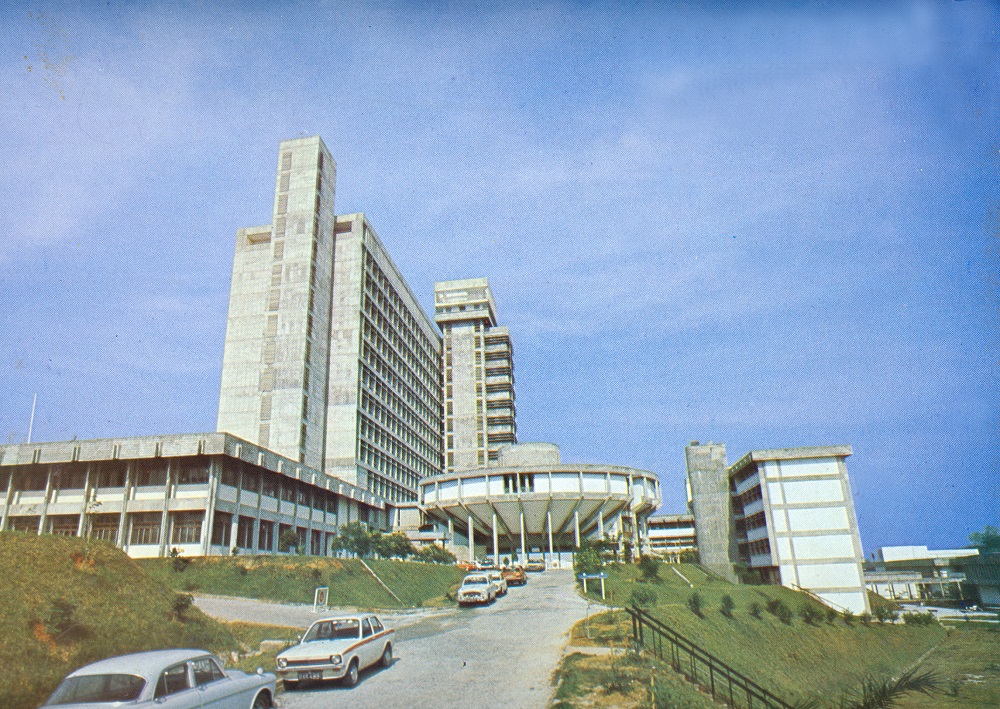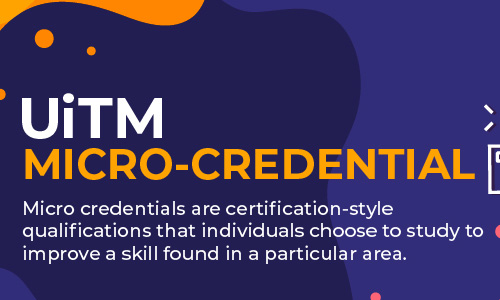UiTM History
1956 - 1965
Dewan Latihan RIDA (RIDA Training Centre)

The Rural and Industrial Development Authority (RIDA) Training Centre was inspired by Dato' Onn Ja'afar, the founder and former President of the United Malays National Organisation (UMNO).
The idea was conceived as a result of a study visit to Ceylon (now Sri Lanka) in 1951 to look into its rural development programme. A resulting working paper outlined the establishment of RIDA and its objectives of rebuilding the rural society and improving the rural community's economy. There were two centres under the auspices of RIDA: Taman Asuhan RIDA (Kuala Lumpur) and Dewan Latehan RIDA (Petaling Jaya).
Dewan Latehan RIDA began operations in November 1956 under its first principal, Tuan Syed Alwi bin Syed Sheikh Alhadi. It was officially inaugurated by Dr Ismail bin Dato' Abdul Rahman, the Minister for Trade and Industry, on 14 October 1957.
Dewan Latehan RIDA conducted several external professional courses offered by established international bodies, including the London Chamber of Commerce, the Australian Chartered Secretaryship of Management, the Australian Society of Accountants, and the British Institute of Management.
In 1964, Dewan Latehan RIDA held its first convocation, at which 50 graduates were awarded certificates by Tun Abdul Razak, then Deputy Prime Minister of Malaysia.
1956 - 1965
1965 - 1967
MARA College

Dewan Latehan RIDA became known as Maktab MARA or MARA College in June 1965. The name change also meant that the college no longer operated under RIDA, but instead became the most important unit of the MARA Training Division.
MARA, which stands for Majlis Amanah Rakyat or the Council of Trust for the Indigenous People, took over and strengthened the role and responsibilities of RIDA. In 1966, when the British Institute of Management ceased conducting external examinations, MARA College began running its own Diploma in Business Studies. International recognition for the course came from Ealing Technical College of London, which also became its external examiner.
This linkage with an internationally established institution proved to be the first of many future linkages, a tradition that continues to this day at UiTM.
1967 - 1999
Institut Teknologi MARA (MARA Institute of Technology)

Results of a study undertaken by the government with the assistance of the United Nations in 1965 stated that the country faced a shortage of trained workers at the professional and semi-professional levels among the Bumiputeras. To overcome this problem, 300 acres of land in Shah Alam were approved for the MARA college campus. MARA College was officially renamed Institut Teknologi MARA on 14 October 1967, launched by YAB Tun Abdul Razak.
Its establishment came as a response to a crucial need in the country for trained manpower at professional and semi-professional levels, especially among Bumiputeras. ITM's rapid development during those years was primarily driven by the expansion of its educational programs, which were aligned with the requirements of an increasingly demanding job market. Many courses were internationally affiliated, and the institute offered advanced diploma courses, which were equivalent to general degrees.
ITM's development is best seen from three phases that spanned 32 years. The first phase (1967-1976) commenced with the declaration of the institute as an autonomous body, featuring its 300-acre campus in Shah Alam, and was placed under the Ministry of Rural Development.
The second phase (1976-1996) saw ITM rapidly harnessing its potential as an institution of higher learning. It led to the passing of the ITM Act of 1976, which placed the institute directly under the Ministry of Education.
The third phase (1996-1999) came about as a result of an amendment to the 1976 Act, which put ITM on par with all the universities in the country. For functional purposes, ITM was granted all the powers of a university. However, its historical name was retained until August 26, 1999. The main areas of change are as follows:
The governing body of ITM, the Council, was reorganised into the Board of Directors, featuring a larger representation from the private sector than before.
The Board of Directors was given the power to enact on behalf of the institute.
A senate was created.
Many principal officers of ITM were reappointed under different names. The Director was renamed Rector, the Head of Campus became the Provost, while Principal and Senior Lecturers were redesignated as Professors and Associate Professors, respectively.
Each school was redesignated as a faculty.
ITM was granted the authority to confer degrees up to the Ph.D. level.
ITM was granted the unique authority to establish courses and campuses abroad, subject to the Minister of Education's permission.
The institute was granted additional powers to enable it to conduct business, invest in shares, establish companies, and engage in commercial research.
Disciplinary powers over staff were transferred from the Ministry to the Board of Directors.
To improve staff accountability, the institute was bestowed the power to impose a surcharge.
The procedural rights of students in disciplinary proceedings were strengthened.
During this time, ITM had established a branch in each state. The first campus was built in Sabah in 1973, and the last campus was in Kuala Pilah, Negeri Sembilan, in June 1999. Almost all branch campuses started their operations on temporary premises, and these establishments had a well-organised strategy and plan. All branch campuses were then moved to permanent locations except for the Kuala Pilah campus.
1967 - 1999
August 26, 1999 - Present
Universiti Teknologi MARA

On 26 August 1999, the then Prime Minister of Malaysia, YAB Dato' Seri Dr Mahathir Mohamad, announced the change in the name of ITM to Universiti Teknologi MARA (UiTM).
UiTM aspires to be world-class in all its endeavours and forges ahead in a direction that is in tandem with the latest global developments. To meet this aspiration, UiTM acquired the ISO 9001:2000 recognition on 5 August 2004 and became the first university to receive certification covering corporate management, support services, and teaching and learning.
As UiTM moves forward, it remains focused on academic excellence, innovation, socio-economic goals, worldwide accreditation, globalisation, and new technologies to contribute to industry and national development.

Universiti Teknologi MARA Act 173
Act 173 was drafted in conjunction with the establishment of UiTM. It was deemed essential, as the Act provides guidelines for maintenance and smooth administration, as well as other matters pertaining to it. The Act also serves as an acknowledgement of the institution’s transition from an institute to a university, and the authority bestowed upon it to function like any other university. This includes the offering of courses of study and the conferment of degrees at all levels of education.




